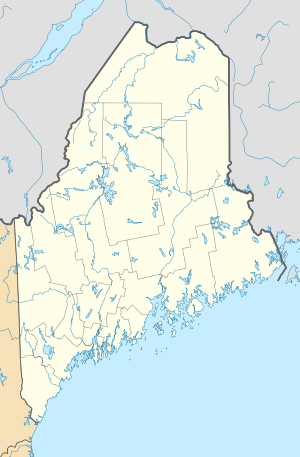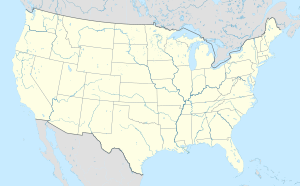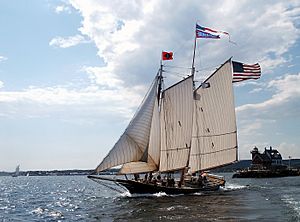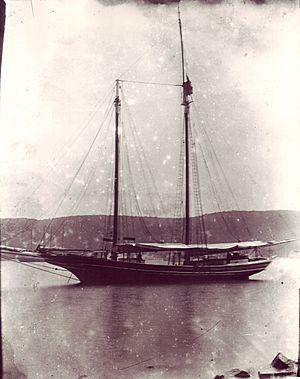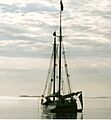Stephen Taber (schooner) facts for kids
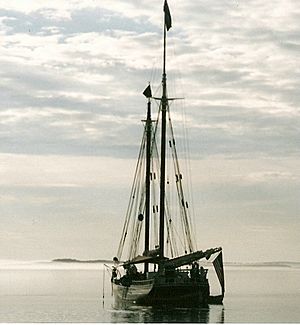
The Stephen Taber sailing on the water.
|
|
Quick facts for kids History |
|
|---|---|
| Name | Stephen Taber |
| Launched | 1871 |
| General characteristics | |
| Tonnage |
|
| Length |
|
| Beam | 22 ft 5 in (6.83 m) |
| Draft |
|
| Sail plan | Schooner |
|
Stephen Taber
|
|
| Location | Rockland, Maine |
| Built | 1871 |
| Architect | VanCott, A.W., Shipyard; Bedel Shipyard |
| NRHP reference No. | 84001386 |
| Significant dates | |
| Added to NRHP | 30 July 1984 |
| Designated NHL | 4 December 1992 |
The Stephen Taber is a very old and special sailing ship. She is a two-masted schooner, which means she has two tall masts for sails. This historic ship was built way back in 1871.
Today, she works as a "windjammer" in Rockland, Maine. This means she takes tourists on fun sailing trips. The Stephen Taber is so important that she is a National Historic Landmark. She is one of the few old schooners left that were built to carry goods along the Atlantic coast.
What makes her extra special is her "centerboard." This is a movable fin that can go up or down. It lets her sail in shallow water or get close to shore. The ship is named after Stephen Taber, a lawyer and politician from New York. She has been sailing and working almost continuously since she was built!
What Makes the Stephen Taber Special?
The Stephen Taber is a wooden schooner with a long history. Her deck is about 68 feet (21 m) long, and her total length is about 115 feet (35 m). She is about 22 feet 5 inches (6.83 m) wide.
One of her unique features is her centerboard. When the centerboard is up, she only needs about 5 feet (1.5 m) of water to float. When it's down, she needs about 14 feet 6 inches (4.42 m). This helps her get into many different harbors.
A crew of five people usually operates the ship. She has a mailsail, a foresail, and two headsails, just like in an old photograph from 1883. Her main structure is made of strong oak wood.
A Look at Her History
The Stephen Taber was launched in October 1871. She was built at Bedel Shipyard in Glenwood Landing, New York. This shipyard is on the south coast of Long Island Sound.
The Cox brothers owned her first, and they named her after Stephen Taber. He was a lawyer and a politician from Roslyn, New York. A politician is someone who works in government and helps make decisions for the public.
For about 50 years, until 1920, she mostly worked around New York Harbor. She carried goods like lumber, coal, and bricks. Sometimes, when business was slow, she even carried passengers for short trips in 1900 and 1902.
In 1920, a captain in Maine bought her. She then sailed around Penobscot Bay. In 1946, Captain Boyd Build bought her. He changed her so she could take tourists on sailing adventures. This is called the "windjammer" trade.
Since then, she has continued to be a popular tourist ship, now based in Rockland, Maine. The Stephen Taber has been sailing almost non-stop. She only stopped for important repairs and restoration work in 1900, 1930, and from 1981 to 1983.
Images for kids
 | Chris Smalls |
 | Fred Hampton |
 | Ralph Abernathy |


